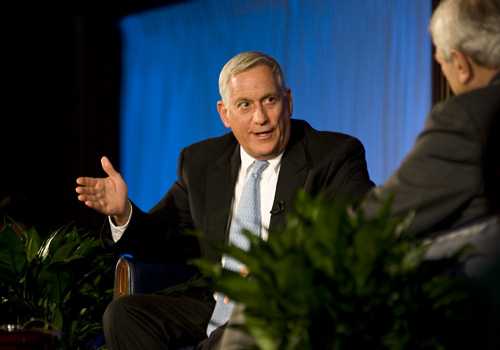
This post was written by Hatchet reporter Katherine Rodriguez.
The author of bestselling biography on Steve Jobs reflected Tuesday on his relationship with the late Apple co-founder in the latest installment of The Kalb Report.
Walter Isaacson, who has already written biographies on Benjamin Franklin, Albert Einstein and Henry Kissinger, sounded off to moderator Marvin Kalb at the National Press Club on closeness he developed with Jobs, one of the leading technology innovators in history.
“I became so emotionally attached to him,” Isaacson said. “I thought it was very difficult not only to be writing about someone who was living, but someone who was dying. You have to have a feel for the product you create.”
Isaacson, the president and chief executive officer of the nonprofit Aspen Institute and former chief executive officer of CNN, spent two years interviewing Jobs with almost complete access to his life, interviewing more than 40 family members and friends.
“Steve Jobs,” which was released in October, has spent 20 weeks on The New York Times bestseller list and was Amazon.com’s bestselling book of 2011.
Isaacson highlighted Jobs’ impersonal and “rough-around-the-edges” demeanor but also defended him when he pointed out Jobs’ ability to inspire and his close connections among his friends.
“I hope the narrative arc of the book shows that his petulance was connected to his passion,” Isaacson said.
Issacson also discussed his next project: a book that will chronicle the history of the digital age.
He compared journalism’s changing business structure and the digital age’s revolution to “blind men feeling their way toward the light” in how people have learned to share information.
He said that innovators like Jobs broke the power of the “gatekeepers” in journalism through new technologies, like the iPad. The innovations made journalism more accessible, he said, and could lead to more profitability for media organizations.
“I think there are good leaders in journalism, but I think we’re missing the innovators in journalism like Steve Jobs was running Apple,” Isaacson said. “It’s people who can make imaginative leaps that can amount to something.”




